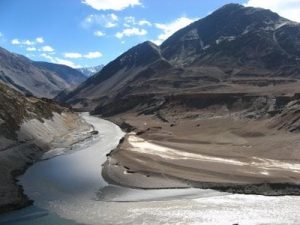The first hearing in the Pak-India dispute over the Indus Water Treaty was held by the Arbitration Court.
According to the AGP’s office, the treaty cannot be amended in a manner that is unilateral.

ISLAMABAD:
According to a statement that was released by the office of the Attorney General for Pakistan (AGP), the first hearing of a dispute between Pakistan and India in accordance with the Indus Waters Treaty began on Friday at the Permanent Court of Arbitration in The Hague, which is located in the Netherlands.
The AGP Office took note of news articles that were circulating in the Indian press reporting India’s attempted unilateral amendment of the Indus Waters Treaty and stated that “such stories are deceptive.” This was done after the AGP Office took notice of the stories.
“The treaty cannot be altered in one party’s sole discretion. This is an effort to detract attention away from the proceedings that are currently taking place at the Permanent Court of Arbitration in accordance with the Indus Waters Treaty.”
According to the statement, the disagreement stems from Pakistan’s concerns regarding India’s construction of the 330MW Kishenganga hydroelectric project on River Jhelum and India’s plans to construct the 850MW Ratle Hydroelectric Project on River Chenab in Indian Illegally Occupied Jammu & Kashmir. Both of these projects are located in Indian Illegally Occupied Jammu & Kashmir (IIOJK).
“Mr. Ahmad Irfan Aslam, Additional Attorney-General, is serving as the head of Pakistan’s delegation to the court. Other members of Pakistan’s delegation include Mr. Hassan Nasir Jamy, Secretary of the Ministry of Water Resources, and Syed Muhammad Mehar Ali Shah, Pakistan’s Commissioner for Indus Waters. Mr. Ahmad Irfan Aslam is serving as the head of Pakistan’s delegation to the court. In the legal proceedings involving Pakistan, one of the advocates is a British barrister by the name of Sir Daniel Bethlehem, KC.”
On August 19, 2016, Pakistan demanded the establishment of the ad hoc Court of Arbitration in accordance with Article IX of the Indus Waters Treaty. This action marked the beginning of legal procedures between the two countries.
After vehemently voicing its objections at the Permanent Indus Commission beginning in 2006 for the Kishenganga project and in 2012 for the Ratle project, and after seeking a resolution in government level talks held in New Delhi in July 2015, Islamabad decided to take this move. The intransigence with which India has refused to address Islamabad’s concerns is what prompted Pakistan to make the decision to start legal procedures.
“The treaty establishes two different venues for the resolution of disputes: the Court of Arbitration, which deals with legal, technical, and systemic matters; and the Neutral Expert, who deals primarily with technical concerns. Because there are structural concerns that need to be interpreted legally, Pakistan submitted a request to have the Court of Arbitration established.”
India’s belated request for the appointment of an impartial expert was Pakistan’s response to India’s launch of a formal dispute settlement process. Pakistan had initiated the process. The statement went on to say that India’s submission of a late request for the resolution of disputes brought up by Pakistan was an example of India’s typical lack of good faith.
On December 12, 2016, out of concern that two parallel processes might produce results that are inconsistent with one another, the World Bank suspended the procedures for the establishment of the Court of Arbitration and the appointment of the neutral expert, and it invited both countries to negotiate and come to an agreement on a single forum.
Because Pakistan and India were unable to come to an agreement on a forum that would be acceptable to both parties, the World Bank was forced to take action. After a period of six years, during which time India finished building the Kishenganga project, the World Bank finally lifted the suspension, created the Court of Arbitration, and appointed a neutral expert.
According to the statement, Pakistan is of the opinion that any potential for outcomes that are at odds with one another can be mitigated via coordination and collaboration between the two fora. Pakistan is actively participating in both forums. In contrast, and in typical poor faith, India has chosen not to participate in the proceedings of the Court of Arbitration. According to the statement, the Court has the authority to proceed ex parte and is doing so at this time.










































